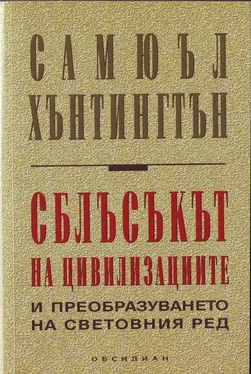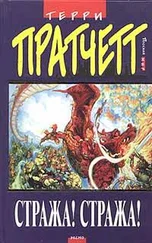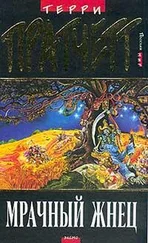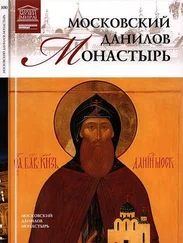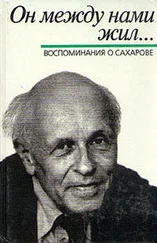Geert Hofstede, „National Cultures in Four Dimensions: A Research-based Theory of Cultural Differencies among Nations“, International Studies of Management and Organization, 13 (1983), 52.
Harry С Triandis, „Cross-Culrural Studies of Individualism and Collectivism“, Nebraska Symposium on Motivation 1989 (Lincoln: University of Nebraska Press 1990), 44–133 и New York Times, 25 December 1990, p. 41. Вж. също George С. Lodge and Ezra F. Vogel, eds., Ideology and National Competitiveness: An Analysis of Nine Countries (Boston: Harvard Business School Press 1987), на различни места.
Дискусиите за взаимодействието на цивилизациите почти неизбежно стигат до някакъв вариант на тези типове реакция. Вж. Arnold J. Toynbee, Study of History (London: Oxford University Press, 1935–61). II, 187ff, VIII, 152–153, 214; John L. Esposito, The Islamic Threat: Myth or Reality (New York: Oxford University Press, 1992), pp. 53-62; Daniel Pipes, In the Path of God: Islam and Political Power (New York: Basic Books, 1983), pp. 105–142.
Pipes, Path of God, p. 349.
William Pfaff, „Reflections: Economic Development“, New Yorker, 25 December 1978, p. 47.
Pipes, Path of God, pp. 197–198.
Ali Al-Amin Mazrui, Cultural Forces in World Politics (London: James Currey, 1990), pp. 4–5.
Esposito, Islamic Threat, pp. 55-62; и Pipes, Path of God, pp. 114–120.
Rainer С Baum, „Authority and Identity — The Invariance Hypothesis II“, Zeitschrift fur Soziologie, 6 (Oct. 1977), 368–369. Вж. също Rainer С. Baum, „Authority Codes: The Invariance Hypothesis“, Zeitschrift fur Soziologie, 6 (Jan. 1977), 5–28.
Вж. Adda B. Bozeman, „Civilizations Under Stress“, Virginia Quarterly Review, 51 (Winter 1975), с 5ff; Leo Frobenius, Pai-deuma: Umrisse einer Kultur- und Seelenlehre (Munich: C.H. Beck 1921), pp. llff; Oswald Spengler, The Decline of the West (New York: Alfred A. Knopf, 2 vols., 1926, 1928), II, pp. 57ff.
Bozeman, „Civilizations Under Stress“, p. 7.
William E. Naff, „Reflections on the Question of «East and West» form the Point of View of Japan“, Comparative Civilizations Review, 13/14 (Fall 1985 & Spring 1986), 222.
David E. Apter, „The Role of Traditionalism in the Political Modernization of Ghana and Uganda“, World Politics, 13 (Oct. I960), 47–68.
S. N. Eisenstadt, „Transformation of Social, Political, and Cultural Orders in Modernization“, American Sociological Review, 30 (Oct. 1965), 659–673.
Pipes, Path of God, pp. 107, 191.
Braudel, On History, pp. 212–213.
Jeffery R. Barnett, „Exclusion as National Security Policy“, Parameters, 24 (Spring 1994), 54.
Aaron L. Friedberg, „The Future of American Power“, Political Science Quarterly, 109 (Spring 1994), 20–21.
Hedley Bull, „The Revolt Against the West“ в Hedley Bull and Adam Watson, eds., Expansion of International Society (Oxford: Oxford University Press, 1984), p. 219.
Barry С Buzan, „New Patterns of Global Security in the Twenty-first Century“, International Affairs, 67 (July 1991), 451.
Project 2025 (draft) 20 September 1991, p. 7; World Bank, World Development Report 1990 (Oxford: Oxford University Press, 1990), pp. 229, 244; The World Almanac and Book of Facts 1990 (Mahwah, NJ: Funk & Wagnalls, 1989), p. 539.
United Nations Development Program, Human Development Report 1994 (New York: Oxford University Press, 1994), pp. 136–137, 207-211; World Bank, „World Development Indicators“, World Development Report 1984, 1986, 1990, 1994; Bruce Russett et al., World Handbook of Political and Social Indicators (New Haven: Yale University Press, 1994), pp. 222–226.
Paul Bairoch, „International Industrialization Levels from 1750 to 1980“, Journal of European Economic History, 11 (Fall 1982), 296 304.
Economist, 15 May 1993, p. 83, цитиращ International Monetary Fund, World Economic Outlook; „The Global Economy“, Economist, 1 October 1994, pp. 3-9; Wall Street Journal, 17 May 1993, p. A12; Nicholas D. Kristof, „The Rise of China“, Foreign Affairs, 72 (Nov./Dec. 1993), 61; Kishore Mahbubani, „The Pacific Way“, Foreign Affairs, 74(Jan./Feb. 1995), 100–103.
Включително и страните от Варшавския договор през периода на Студената война.
Изчисленията за православната цивилизация включват бившия Съветски съюз и бивша Югославия. + Под рубриката „Други“ са включени други цивилизации и допустими грешки при закръглянето.
Делът за СССР е въз основа на изчисления за 1924 г. J. М. Mackintosh in Н. В. Liddel-Hart, The Red Army — 1918-1945; The Soviet Army-1946 to Present (New York: Harcourt, Brace, 1956).
International Institute for Strategic Studies, „Tables and Analyses“, The Military Balance 1994–95 (London: Brassey’s 1994).
Project 2025, p. 13; Richard A. Bitzinger, The Globalization of Arms Production: Defense Markets in Transition (Washington, D.C.: Defense Budget Project, 1993), passim.
Връзката между власт и култура почти напълно се подценява от тези, които смятат, че вече възниква универсална цивилизация, че дори е задължително тя да се появи, както и от тези, които под-държат, че позападняването е предпоставка за модернизацията. Те не искат да признаят, че самата логика на тяхната постановка изисква те да поддържат експанзията и консолидацията на господството на Запада в света и че ако се оставят останалите общества да определят сами съдбата си, те ще възстановяват стари вярвания, обичаи и порядки, което според протагонистите на тезата за универсалната цивилизация е противопоказно за прогреса. Хората, които изгъкват предимствата на универсалната цивилизация обаче, обикновено не изтъкват предимствата на универсалната империя.
Joseph S. Nye, Jr., „The Changing Nature of World Power“, Political Science Quarterly, 105 (Summer 1990), 181–182.
Читать дальше
